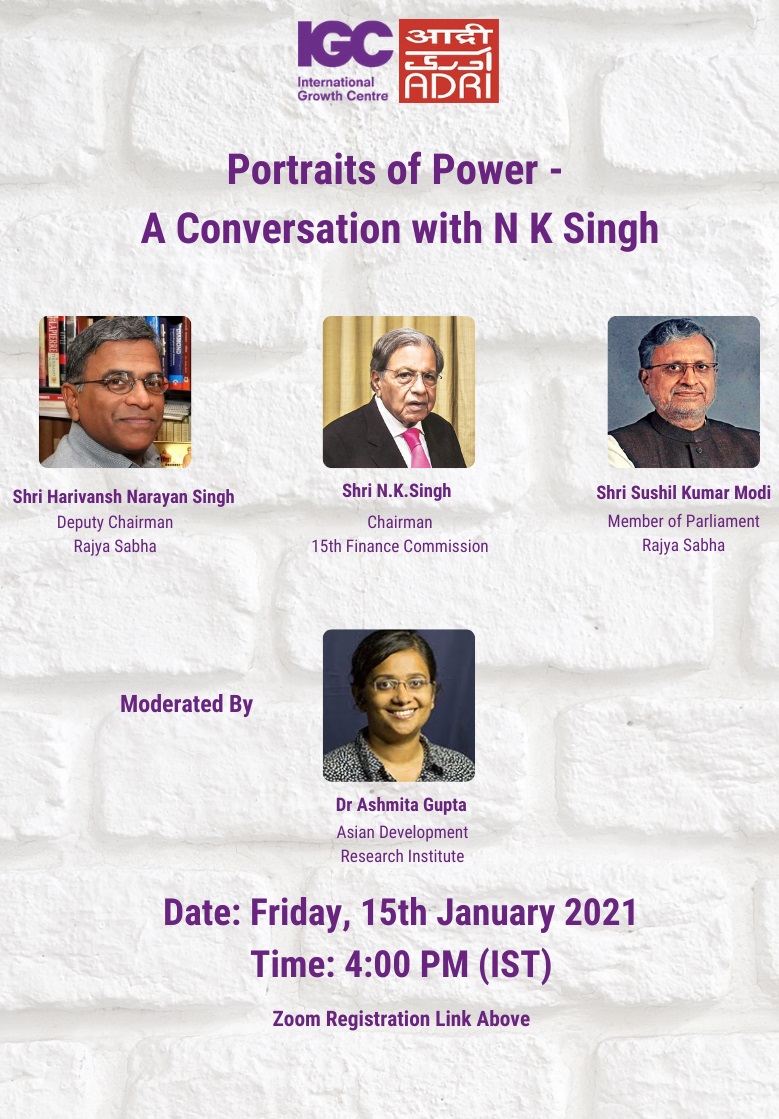Events of IGC

Title: Portraits of Power - A Conversation with N. K. Singh
Panellists: Shri Harivansh Narayan Singh (Deputy Chairman - Rajya Sabha), Shri N. K. Singh (Chairman - 15th Finance Commission), Shri Sushil Kumar Modi (Member of Parliament - Rajya Sabha) and Dr Ashmita Gupta (Faculty - Asian Development Research Institute)
Date and Time: 15th January 2021 at 16.00 to 17.30 (IST)
Zoom Link for Registration: Registration Link
Brief: N. K. Singh’s book ‘Portraits of Power: Half a Century of Being at Ringside’ is a personal narrative; which highlights India’s changing role in the global and national economic landscape over the years. This book gives us an opportunity to create a platform to discuss this enriching personal journey, that encompasses the depth of the work that N. K. Singh has carried across decades and looked into the lessons of the past, present and future of the economic and policy landscape in India and particularly Bihar.
To discuss this journey which is interwoven across decades of India’s economic policy history, International Growth Centre (IGC) of London School of Economics (LSE) and Asian Development Research Institute (ADRI) is organising a webinar titled ‘Portraits of Power - A Conversation with N. K. Singh’ on 15th January 2021 at 16:00 IST.
Patna, 15 January. The International Growth Centre (IGC) and Asian Development Research Institute (ADRI) organised a webinar titled, ‘Portraits of Power - A conversation with Shri N.K. Singh’ on 15th January 2021. The panel was moderated by Dr. Ashmita Gupta (ADRI) and event panellists were Shri Harivansh Narayan Singh (Deputy Chairman, Rajya Sabha), Shri N.K. Singh (Chairman, 15th Finance Commission), and Shri Sushil Kumar Modi (Member of Parliament, Rajya Sabha).
N.K. Singh’s book ‘Portraits of Power: Half a Century of Being at Ringside’ is a personal narrative which highlights India’s changing role in the global and national economic landscape over the years. It also reflects the multitude of institutions that work in tandem to create the economic and policy environment in the country. It covers a wide spectrum of issues ranging from India’s agrarian economy, the struggle during independence, our initial trauma, the far-reaching economic reforms of 1991, the issues of foreign trade and its evolutions, and finally to the progressive deregulation of the Indian economy. In a sense, therefore, it is also like looking through a kaleidoscope.
N K Singh - “There is the enigma that while Biharis flourish, Bihar languishes. One way in which we can solve this enigma is by improving Bihar’s growth initiatives, especially in creating jobs for gainful employment”
Sushil Kumar Modi - “It is important to look at the history of Bihar's growth. Bihar's development resumed after a gap of 45 years & when Nitish Kumar's govt came it became difficult deciding what to prioritize for development because everything seemed important law & order, agriculture, industry”
Harivasnh Narayan Singh - “Reflecting on N.K.Singh's conversation with Dr. Manmohan Singh, he mentions that ‘a prosperous India needed a prosperous Bihar’. Thus, it is definitely important that we need to think more about the backward states for an inclusive growth"
N K Singh - “I do believe in the hindsight that the false hiatus for the manufacturing sector - It was said that India will be known for the IT sector and service sector and China on the other hand will be the manufacturing sector nation. I do not agree with this distinction. I think the big factor for manufacturing to take off is we need more abiding reforms. The philosophy of atma nirbhar bharat , credit to our PM Narendra Modi, it does not mean protectionist bharat but instead it is to harness its own competitive advantage and will help create more and more industrial activities. Thereby, India is deemed to ride the three engines that are the service sector, manufacturing, and agricultural sector.
While discussing the Finance Commission Mr N K Singh stated that “The difficult part we come across in the reconciliation exercise is the need to balance three things - equity, efficiency and needs of the states and union. The choice to decide between rewarding the states who have used the resources efficiently and balancing equity is difficult. It also requires balancing the demands of the states and the union”.
Sushiil Kumar Modi stated that “Bihar definitely has benefitted from the Union govt. Recommendations of the Finance commission are very important. How to balance between Kerala and Bihar or WB or NE states and it all comes down to criterias set by the Finance Commission - in reality it is difficult to strike a balance between developed and developing states. Bihar has not been able to utilize or take advantage of the Central Sponsored Schemes properly because of the criterias that are set such as the performance criterias. Bihar's share from the budget has been decreasing over the years but it has definitely benefited from the Finance Commission’s recommendation a lot”